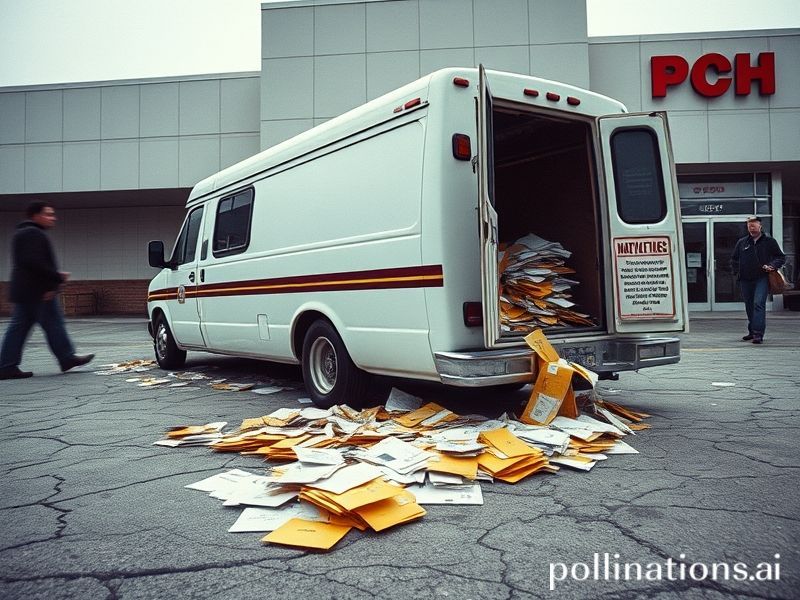Giant Checks Bounce: Publishers Clearing House Bankruptcy Shocks Global Faith in Free Lunches
Publishers Clearing House Files for Bankruptcy, Proving Even the House Can Lose the Sweepstakes
By Our Correspondent in a Café That Still Accepts Physical Mail
NEW YORK—The envelope that once promised “You may already be a winner!” has finally delivered its punch line: Publishers Clearing House (PCH) filed for Chapter 11 protection in Delaware this week, citing $1.2 billion in liabilities and the inconvenient truth that fewer humans under forty know what a stamp is. Internationally, the collapse of America’s premier purveyor of giant cardboard checks lands somewhere between a quaint cultural footnote and a cautionary tale about what happens when nostalgia meets compound interest.
For decades PCH was the closest thing the United States had to a state lottery without the pretense of funding education. Abroad, the brand’s ubiquity was limited to late-night satellite feeds of American sitcoms, where bewildered Germans or Brazilians would watch Ed McMahon ambush an octogenarian on her porch. The spectacle became a shorthand for the American dream itself: random, televised, and tax-deductible. Now the dream has filed schedules of assets and liabilities like any other deadbeat, and foreign observers are left to wonder whether the contagion will spread to other national delusions—perhaps Japan’s “scratch-and-sniff” prize ramen or Italy’s upcoming SuperEnalotto NFT.
The immediate global fallout is, predictably, modest. PCH’s international subsidiaries—an oxymoron akin to “British enthusiasm”—consist mainly of a dormant Canadian sweepstakes and a Philippine call center that keeps trying to upsell widows on commemorative plates. Still, the bankruptcy trustee must now locate and catalogue roughly 3.2 million unopened sweepstakes entries currently circling the globe in cargo containers, a task akin to reassembling a shredded atlas while drunk. Customs officials in Rotterdam have already seized one container after mistaking the envelopes for a particularly bureaucratic drug shipment.
Meanwhile, supply-chain economists—yes, they exist—note that PCH’s demise removes a small but measurable demand for bulk paper, glitter ink, and the type of stickers that scream “URGENT!” in six languages. Finland’s forestry sector, already reeling from Europe’s pivot to digital receipts, has downgraded its outlook from “bleak” to “existential.” If that sounds melodramatic, remember that Nordic paper mills measure profits by the microgram, and every canceled American sweepstakes is another reindeer that won’t get dental coverage.
The broader significance, however, lies in what PCH’s bankruptcy reveals about the global pivot from physical illusion to digital delusion. Where once a retiree in Naples could clutch an envelope bearing a New York postmark and dream of flying first-class to Florida, now he scrolls Instagram ads promising 50 free spins if he simply hands over his IBAN. The medium has evolved; the grift remains eternal. In that sense, PCH isn’t dying—it’s migrating, like a salmon seeking upstream servers. Expect the brand to re-emerge as a blockchain-based sweepstakes where winners receive an NFT of Ed McMahon tipping his hat, redeemable for fractional ownership of a timeshare in Boca.
There is, of course, pathos amid the punch lines. Roughly 400 employees worldwide woke up Monday to learn their jobs had been downsized into a Zoom link. The company’s union, a charming anachronism itself, issued a statement lamenting the loss of “steady, dignified work,” though it tactfully omitted that the dignity involved convincing strangers they’d won yachts they couldn’t pronounce. Still, in an era when entire industries pivot from fossil fuels to fintech overnight, perhaps we should salute PCH for its consistency: it spent seventy years selling the same fantasy, only to discover the market finally ran out of greater fools. That’s not failure; that’s brand discipline.
In the end, the bankruptcy court will auction the furniture, the magazine back catalog, and at least one gigantic check made of foam core. International bidders are welcome; shipping, alas, is not included. As the gavel falls, remember this: somewhere in a Manila call center, a former PCH employee is already pitching commemorative plates commemorating the commemorative plates. The envelope, like history, never really closes—it just gets recycled.







